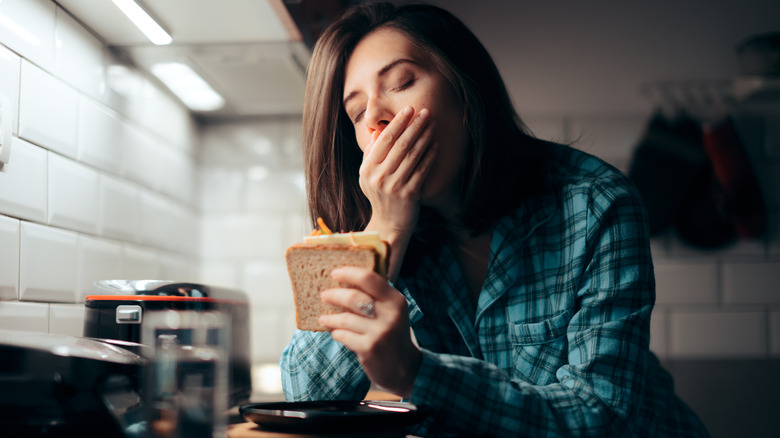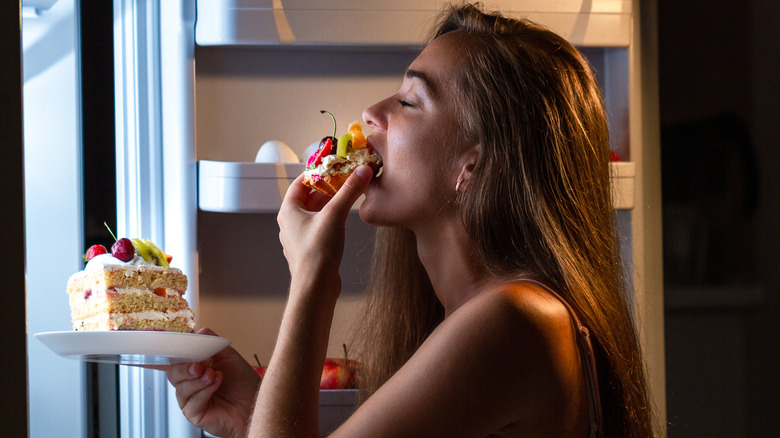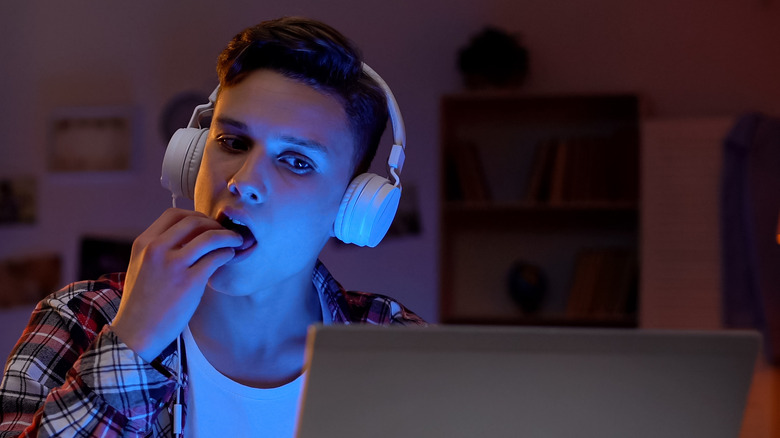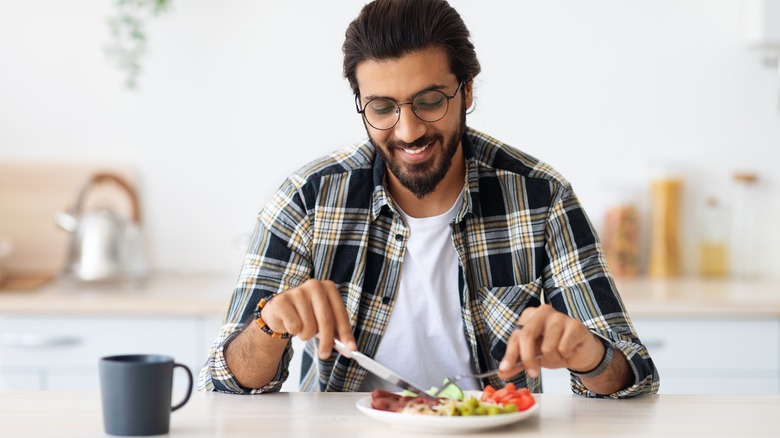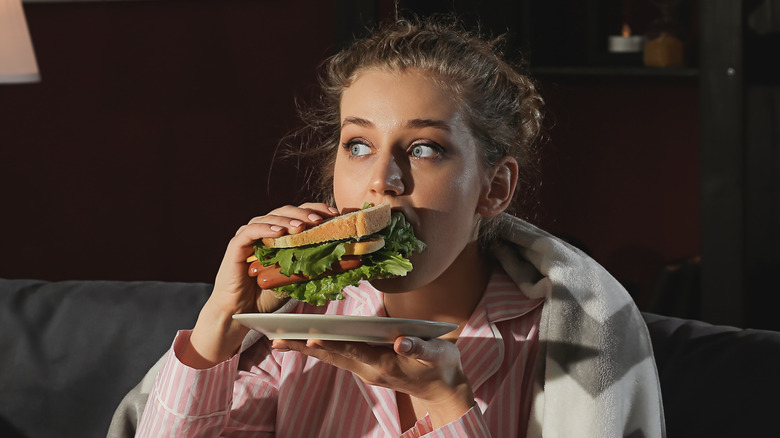Why Do We Get Snack Cravings Late At Night?
Tend to hear the call of the fridge late at night, either before bed or even sometimes after you've been asleep for a while? You're not alone. Turns out, late-night snack cravings are perfectly natural, and science has discovered why that might be the case.
Curbing calorie consumption at night is important. According to Healthline, nighttime noshing can spike your blood sugar levels, contribute to weight gain, and even worsen your chances of heart disease, among other drawbacks.
Research indicates that eating better all throughout the day will reduce the urge to snack late at night, and minimize the attendant health problems for which nocturnal nibbling is known. There may even be social-emotional factors to your late-night snack cravings. To know why we all get snack cravings late at night is not to beat yourself up for the occasional PB&J before hitting the hay. Instead, it's to better understand what's happening to our bodies when that pint of ice cream proves too tempting to resist.
The social-emotional influence on late-night snacking
Before we get to what science has discovered about the underlying biology that gives us the urge to eat late at night, there may also be a number of lifestyle factors that contribute to this common bad habit, such as poorly managed emotional health, how much we eat and drink during the day, and even how well we're sleeping. Per the University of Virginia (UVA), stress, boredom, depression, and other negative emotions can cause overeating after dark. Addressing what might cause these bad feelings in your daily life can go a long way toward quashing the practice.
There may also be a hormonal imbalance at play if you find yourself eating too much in your PJs, according to UVA. See your medical provider to find out if that's an issue for you. How much water you drink, as well as how often and exactly what you eat in the daytime, can also help suppress late-night cravings. Your body may crave protein, for example, or possibly carbohydrates. If you're also not getting enough sleep, or the quality of your slumber is sub par, you may also find your body craving carbs. Getting enough of both those things in your three square meals a day, plus adequate rest, puts down peckish feelings later on.
Too much screen time may also play a part
Another common aspect of our modern life that might be a contributing factor to your late-night snack urges is too much screen time. There are a few reasons why this might be the case, according to Eat Right, from the Academy of Nutrition and Dietetics. First of all, we're often on a screen while we're eating, whether our phones or our TVs, and distracted eating such as this means we're not eating enough during the day, and therefore we'll have the urge to eat more at night. But that's not all.
Too much eating while playing a video game or surfing the internet, among other examples of screen time, may also cause us to simply forget that we've eaten, or how much we've consumed. It may even interfere with signals telling our brains that we are full, or that we've eaten at all. What's more, where there are screens, there's commonly advertising full of sugary drinks and junk food, per the World Cancer Research Fund. To help address the issue, put the phone away and try to — gasp — have an actual conversation at meal time.
Eating less at night: tips for success
There are things to be done to curb the habit and the related health issues that can come about from too much night snacking, according to the University of Virginia. First, make sure you're getting enough protein in your diet during the day, such as meat, eggs, or tofu, as that can minimize hunger pangs hours later. Another suggestion is to drink a glass of water, as sometimes people confuse feelings of hunger and thirst. A big drink of water also helps us feel more full.
If you do snack late at night, stick to healthy options and avoid sugar, salt, and fat. It's also a good idea to pre-plan the snacks in small serving sizes to help keep you from eating too much. Takeaway being, there are a whole host of reasons we tend to snack late at night. Being well aware of what might be going on with your when you wander to the may just keep this natural urge in check.
Like to eat late at night? Blame your ancestors
But minimizing screen time and getting your mental health and daily lifestyle right will only go so far to truly address the root cause of after-dark eating. According to Science Daily, the first unavoidable underlying cause that science has discovered to be partially at fault for our late-night snacking is due to our circadian rhythm. Per Sleep Foundation, the circadian rhythm is the little timekeeper we all have in our brain and body that tracks how tired we are, when it's time to sleep, and when it's time to wake up, among other bodily functions.
The role our circadian rhythm plays in snacking late at night is craving cabs, proteins, and sugars before we sleep, as if we'll be fasting. Think of it as something like preparing for hibernation on a 24-hour cycle. In the Stone Age hundreds of thousands of years ago this all made sense, as food was more scarce. These days, though, succumbing too often to that internal time clock telling us it's both time to sleep and time to eat results in too many calories consumed.
Eating at night is obsolete
There are certainly worse habits to have than an occasional light healthy snack late at night. But generally speaking, the link between pre-sleep carb loading is obsolete, according to Science Daily. Per Steven Shea Ph.D., one of the scientists linking late-night eating and the circadian rhythm, that underlying time-keeping mechanism at one point helped manage food intake, but that role is no longer necessary. And we just don't burn as many calories asleep as we do while we're awake, which can lead to obesity.
Supporting this theory, Shea and his colleagues found through their study that people tend to be less hungry at 8 a.m. than they are at 8 p.m., for example. Shea said, "[B]ecause of the internal circadian regulation of appetite, we have a natural tendency to skip breakfast in favor of larger meals in the evening. While this may have been valuable throughout evolution, nowadays it is likely to contribute to the national epidemic of obesity" (per Science Daily).
